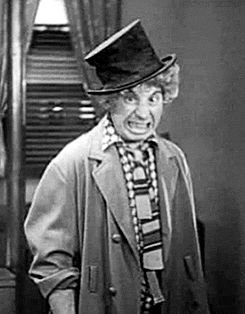THE ONE, THE ONLY -- HARPO!
With a honk and a silent howl of laughter, the story goes like this.
In May 1924, after their Broadway debut, Groucho phoned Harpo, woke him up. “Hey, Harp, have you read the reviews?” Still groggy, Harpo said he only read sports and the funnies.
“Well, this you gotta hear.” Groucho said. “Headline: HARPO MARX AND SOME BROTHERS.”
While Harpo yawned, Groucho read on. “I’ll Say She Is” was a “tuneful excuse for going to see that silent brother, that shy, unexpected, magnificent comic among the Marxes. . . Surely there should be dancing in the streets when a great clown comes to town, and this man is a great clown.”
“Is that all?” Harpo asked. “Nothing about the other brothers?” He hung up and went back to sleep. When he woke, he was a star.
Without a word, he stole your heart. He was the prankster, the imp, the grown child in all of us. Swinging from sets in “A Night at the Opera,” taking over a puppet show in “Monkey Business,” pulling another impossible prop — a blow torch, a cup of coffee, a mackerel — out of his trench coat. Comedy has wits to rival Groucho, con men like Chico, but there was only one Harpo.
Actually two. The child and the man inside.
“If you’ve ever seen a Marx Brothers picture,” he wrote in Harpo Speaks, “you know the difference between Him and Me. When He’s chasing a girl across the screen, it’s Him. When he sits down to play the harp, it’s Me.”
His comic story might have been tragic. Son of a struggling tailor in Manhattan, Adolph Marx was overshadowed by his cunning brother Leonard and the fast-talking Julius. Small and shy and Jewish, he was bullied in school. In second grade, whenever the teacher stepped out, two Irish toughs threw little Adolph out the window. Finally, “one sunny day when Miss Flatto left the room and I was promptly heaved into the street, I picked myself up, turned my back on P.S. 86 and walked straight home. And that was the end of my formal education.”
He worked in the mean streets, selling newspapers, shining shoes. When the Marxes’ stagestruck mother Minnie got her sons into vaudeville, he was too shy to join them. Finally, at age 20, he relented and was soon trading one-liners. But he got few laughs, so he began dreaming up sight gags. Pratfalls. Leers. Funny faces. He said less and less until one reviewer wrote that he “creates a wonderful world of pantomime that is ruined every time he opens his mouth." He never spoke onstage again.
Groucho’s lines were scripted, but Harpo made up each gag. Plays and screenplays read, “Harpo walks in and does something funny.” Watch him now. Entering every scene, he steals the show.
Touring vaudeville, each Marx honed his zany persona. Adolph, who already played piano and clarinet, took up the harp his mother sent him. Then during a poker game, a card shark gave the brothers nicknames. Leonard, Arthur (changed from Adolph), Julius, and Herbert became Chico, Harpo, Groucho, Zeppo. The brothers took their antics to Broadway, then to film. Fourteen movies brought them worldwide fame that amazed a second grade dropout.
As the talk of Broadway, Harpo joined the Algonquin Round Table as a “full-time listener” to its celebrated wits. He hung out with Gershwin and traded jokes with George Bernard Shaw. He continued to play his beloved harp, practicing hours a day. And when he moved to Hollywood in 1931, he lit up new constellations. Groucho is too bitter for some, Chico gets old after a while, but everyone loves Harpo.
“My dad was the most child-like adult I've ever known,” said Bill Marx. “He took the world in the way a child does - with lots of wonder and very little judgment, with the delight of someone for whom everything is new.”
A bachelor until his late forties, Harpo finally married a former Ziegfeld girl and adopted four kids. “I’d like to adopt as many children as I have windows in my house,” he said. “When I leave for work, I want a kid in every window, waving goodbye." Once, unable to sleep, he woke four-year-old Minnie. At 3:00 a.m., his wife found father and daughter sitting on the floor, playing jacks.
Other Marx Brothers, like their movies, got older and less funny, but Harpo remained fresh. In “Love Happy,” he is last seen dancing across a rooftop, over sixty yet forever young.
Throughout the 1950s, while Groucho hosted “You Bet Your Life,” Harpo turned up on sitcoms and talk shows. He never spoke. Finally, in his farewell appearance, he stepped from silence to talk about his fairy-tale life. He talked and talked, in a deep baritone the world had never heard. “He wouldn’t shut up,” host Steve Allen recalled.
Arthur “Harpo” Marx died in 1964. His funeral was the only time anyone ever saw Groucho cry. Let there be dancing in the streets.













